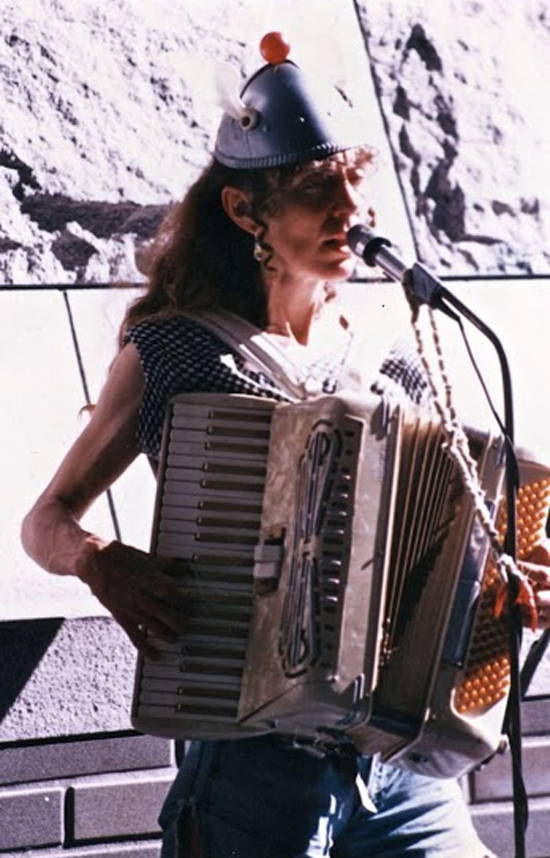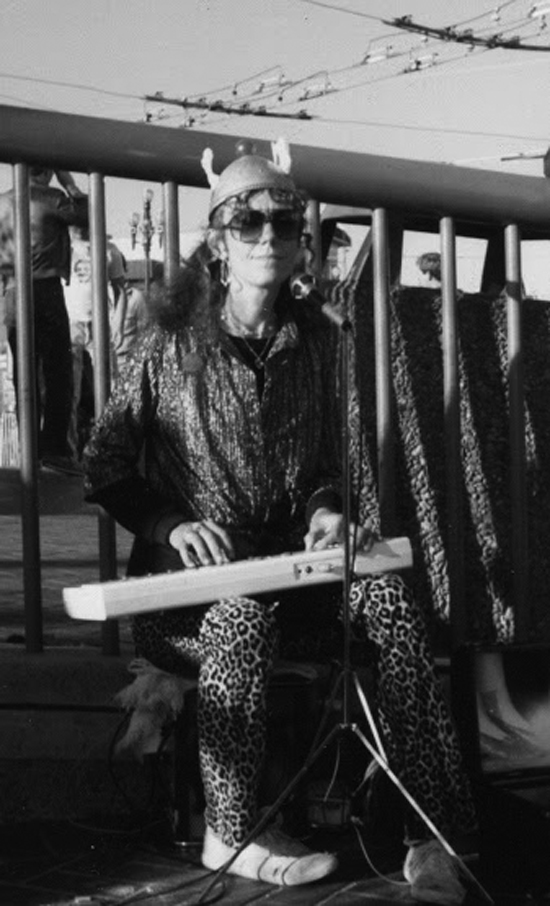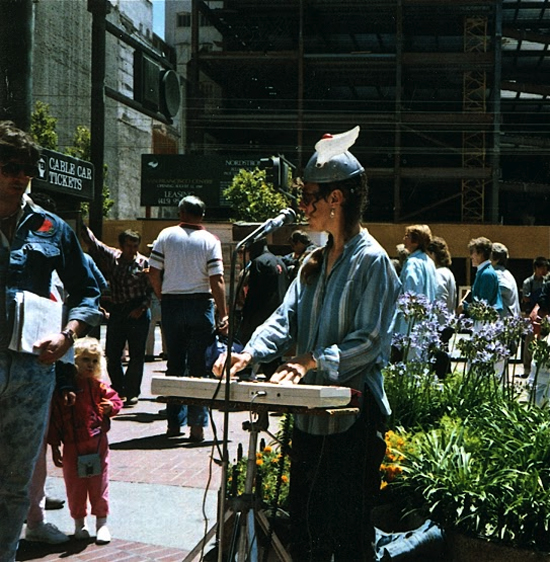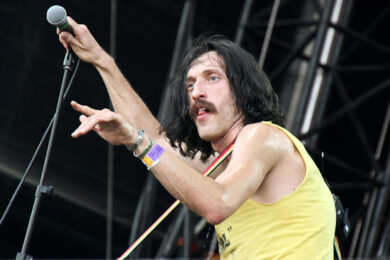"My musician parents lived in Roswell, New Mexico, around the time of the famous flying saucer crash in 1947, and I was born the following January, after they had moved to Pueblo, Colorado…" (The Space Lady’s Greatest Hits, liner notes, 2013)
Susan Dietrich Schneider, alias The Space Lady, is in downtown Buenos Aires. If that sounds like a somewhat earthly locale for a cosmic pop voyager whose biography cites alien abductions, UFO sightings and extraterrestrial exchanges among its adventures, then it bears noting that Argentina marks a geographic feat: The Space Lady may elevate us all with her celestial narratives but, until now (save for a couple of brief border crossings), she has never departed US soil. Not physically, anyway.
Long celebrated and mythologised for her heavenly Casio-busking on the streets of San Francisco and Boston, The Space Lady is finally set to touch down on her first ever UK tour in March and April, which coincides with the recent release of The Space Lady’s Greatest Hits, her spectral anthology on Night School Records. It’s a timely celebration of a mercurial underground artist whose fans include Erol Alkan and John Maus, and whose charms were aligned with Daniel Johnston, Captain Beefheart, Joe Meek and Jandek, on Irwin Chusid’s seminal outsider collection, 2000’s Songs in the Key of Z.
In addition to astral electro reinventions of tracks by The Sweet, The Electric Prunes and Steppenwolf, The Space Lady’s Greatest Hits also features original songs – including glorious tech-pop serenade ‘Humdinger’, and enchanted machine-chorale ‘Synthesize Me’ – which were written by The Space Lady’s collaborator/then-husband, the late Joel Dunsany (aka Mount Helium Pegasus).
The liner notes of The Space Lady’s Greatest Hits are downtrodden and supernatural: they tell of a life spent raising a family hand-to-mouth, and struggling to make ends meet from art, and they recount a kaleidoscopic saga of love and pop and sleeping rough; of draft-dodging and home-made tapes; of hope and cosmic intervention. Her music is similarly full of wonder.
The Space Lady is happy to recount some of these stellar yarns from her sister’s house in Buenos Aires, amid reflections on performing in venues for the first time (as opposed to playing at street level), and her thoughts on the UK’s own UFO hotspot: Scotland’s Bonnybridge Triangle.
"I set up on a spacious corner on 18th and Castro, and began to serenade the passersby. To my delight, not only did money flow in at a steady rate, but also people stopped to talk to me. After work, they flooded past me by the dozens [sic], and many had something to say or give to me, and asked me tough questions, like who were my influences, where did I come from, what was my name? They meant my stage name, and I didn’t have one yet. As time went by, I became known as The Space Lady, thanks to my winged helmet, blinking lights, and ethereal music." (The Space Lady’s Greatest Hits, liner notes, 2013)
Do you think the area in which you were conceived and existed in utero – Roswell, around the time of the reported UFO crash – has had a resonance throughout your life, even if you weren’t aware of it at the time?
Susan Schneider: That’s a good question. You know, I didn’t even realise there was a connection until I came back to Colorado in 2000 and was helping my parents type up their WWII letters for publication. As a kid, I knew they had lived in Roswell, but it wasn’t until the 90s when I started listening to Art Bell’s radio talk show, Coast To Coast AM, that I learned about the fascinating details and cover-up surrounding the UFO crash there. Then, as I was poring through the folks’ letters, I realised they would have been living there around the time I was conceived. So my answer is this: there might well be a connection, and it’s probably no accident that I became The Space Lady.
You’ve previously mentioned that during surgery as a kid, you experienced what you refer to as a "benevolent abduction". Can you please tell me a bit about this, and the subsequent impact it had on your mindset and outlook?
SS: As a child I was more fascinated by the idea of ghosts, not extra-terrestrials. I was a nut for Twilight Zone, which dealt more with weird twists of fate, bargains with the devil, or what might happen after a devastating World War III. The experience you refer to happened much later, when I was actually a young woman of 21, undergoing an abortion across the border in Juárez, Mexico. Thankfully, I was well-treated by a kind and decent doctor, but the process of going under anaesthetic released me from my body, and I was carried up and out of Earth’s atmosphere by some otherworldly beings. That I remember distinctly. What I don’t remember is exactly what my "guides" told me – although it probably wouldn’t be translatable anyway. The best I could ever do is communicate it through my music and my way of life.
Even though I was chronologically 21, I was pretty immature and naive for my age, having grown up in a small, isolated ranching town, eighty desolate miles from the nearest city, and back when there was much less cultural homogenisation by way of TV. So I guess I was pretty open-minded when this happened. But that certainly didn’t make it any less mind-blowing!
Feature continues below image

"As soon as I graduated from high school I was off to the biggest college my parents could afford, Colorado University at Boulder, having seen students there who looked a lot like Bob Dylan and Joan Baez. In the spring of 67 I attended a talk by an esteemed psychologist from Harvard, who walked onto the stage wearing a white robe, bypassed the lectern, and proceeded to sit down on the floor in the lotus position. He did speak, but all I took away from the event, besides a profound visual image, were his legendary words of advice, "Turn on, tune in, drop out," which I did in short order." (The Space Lady’s Greatest Hits, liner notes, 2013)
In the past, you’ve discussed your experiences with psychedelics in the 60s and 70s, and suggested that the heightened state of awareness afforded by them allowed you to channel, or communicate with, extra-terrestrials. Do you think you were predisposed to tap into these astral life forms (as opposed to, say, the spirit world) because of your nascent connection with Roswell? Or do you view these events as being unrelated?
SS: I’m not even sure there is a clear distinction between "spirits" and "extra-terrestrials". At least I think extra-terrestrials may be able to slip in and out of, around and between dimensions, including the dimension we relate to as ours. I can only discuss my personal experiences travelling through those other realms.
My altered perception of reality while on psychedelic drugs came as a total shock to me. When I went off to college at 18, I was a devout atheist, and completely pragmatic about life and death. Nuts and bolts – you lived, you died, that was it, punto, end of story. But when I experienced those altered states of consciousness, my whole philosophical structure crumbled, and that terrified me. And what scared me the most was the realisation that death was not the end! I entered what I can only describe as an alternate universe, and experienced timelessness for myself, first-hand. There was no refuting the immortality of the soul for me ever again after that.
I also experienced direct telepathy with other people, and during one such incident, I received a channelling of cosmic information from some being in another realm. It came directly through a friend who was tripping on acid, and as he began speaking stream-of-consciousness to me and my girlfriend – and both of us were very stoned on grass – his words conveyed cosmic instructions and information we all three knew to be profoundly important and meaningful.
Then, to our shock, we all realised simultaneously that his actual words were completely mundane, as if he were describing how to make a peanut butter sandwich! His mouth fell open and he said, "Oh my God! That’s not what I meant to say at all!" But my girlfriend and I had gotten the true meaning of his words anyway, and told him so. It was one of the strangest and most transformational experiences of my life. I knew there was much more to the cosmos than what we can see and hear on our normal plane of existence, and with our limited senses.
As to who was sending these messages through my tripping friend, my sense was, and still is, that it was from extra-terrestrials, not spirits. But as I said, that may not even be an important distinction.
Is it fair to suggest that the loved-up, no-fi, Casio aria ‘Synthesize Me’ is something of a signature song for The Space Lady? Or are there other tracks which you feel are equally, or more, representative?
SS: I’ve always considered [Peter Schilling’s] ‘Major Tom’ to be my signature song, but ‘Synthesize Me’ probably runs a close second. And although [haunted-rodeo classic] ‘Ghost Riders’ has no reference to outer space per se, it is one of my favourite songs to play, and one of my most requested songs. It’s my old standby when it comes to playing a song anyone can relate to, so I play it a lot! Besides, its theme is supernatural, delving into that spirit world you mentioned before.
Your cover versions also include Steppenwolf’s ‘Born To Be Wild’, The Electric’ Prunes’ ‘I Had Too Much To Dream (Last Night)’ and The Sweet’s ‘Ballroom Blitz’. Would you say there are any particular themes – intentional or subconscious – that run through The Space Lady’s canon?
SS: Well, I always meant to convey a message of peace and harmony, and thought I was choosing my songs accordingly. But in retrospect – and since being in the presence with the living Buddha, Thich Nhat Hanh – I see the difference between peace songs and protest songs. In other words, I won’t be indulging in anger anymore, vehemently and self-righteously singing protest songs, and expecting them to bring peace to me or anyone else. I also plan to write more songs of my own, especially on behalf of the animals we needlessly raise for food, at their great expense, and at great expense to our precious, deteriorating planet.
Having honed your art, and your aesthetic, at street-level, do you think you’ll have to adapt your set-up for the upcoming venue tour?
SS: I have only occasionally played small clubs, and once or twice for an art opening, most notably for the late grafitti artist Keith Haring’s visit to San Francisco. I was an opening act for the San Francisco Gay Film Festival one year, which hosted an audience of over 1,000 people. I also played for numerous parties in San Francisco, although no one ever seemed to listen – the louder people talked, the louder I played, and consequently, the louder people talked. Recently, I played at a coffee house and at the ‘First Friday Art Walk’ in Pueblo, Colorado, as well as busking on Union Avenue there.
So I realise I’ll have to acquire the ability to speak to my audience in between numbers. I’ve never had to do that. On the street I only focus on the keyboard settings for my next song, which takes a bit of time and a lot of concentration. So I’ll have to develop that new skill, which gives me pause, because I’m afraid I’ll say something stupid and disillusion people when they realise I’m an ordinary earthling – in fact, as ordinary as anyone else on this planet.
Feature continues below image

"After a circuitous route of hitchhiking, commune-living, and psychedelic experimentation, I ended up in Haight-Ashbury just as the Summer of Love burst into full bloom. Eventually I hooked up with a hippie named Joel who was dodging the draft, and we went underground together – quite literally, in fact, while living in a cave on Mt. Shasta, up near the Oregon border. It was there we saw a UFO at close range, just above the treetops… and from then on we were convinced we were being watched, if not guided and protected, by aliens." (The Space Lady’s Greatest Hits, liner notes, 2013)
I wondered if you’d heard about the Bonnybridge Triangle? TIME Magazine identified it as one of the world’s Top Six UFO Hotspots a couple of years back – it’s only about a 20-minute drive from your Glasgow venue, and reports in excess of 300 UFO sightings every year…
SS: Joel and I saw a huge UFO flying over our heads just above the treetops on Mt. Shasta back in 1972, and even though I was already a believer, to say I was astounded would be an understatement. That hugely increased my interest in UFOs, as if my ‘abduction’ and psychedelic experiences hadn’t already. But living in Colorado for the past 14 years, I’ve been out of the loop on UFO news – although a local ranching newspaper has reported on bizarre cattle mutilations in the area at least twice that I know of.
I hadn’t heard of the Bonnybridge Triangle, but watching an online news video from Scotland just now, I think the theory of the Ufologist who speculates it might be at the end of a wormhole is quite plausible – more plausible than secret government operations, hallucinations … or swamp gas. So please take me there!
Also, for years I’ve been transfixed and intrigued by the images we get of your intricate crop circles, and I’d be thrilled to see one. Put out a request for a nice demo, please!
Because of the Bonnybridge Triangle’s UFO resonance, I like to think The Space Lady might have some Scottish roots…
SS: My maternal grandmother, whose middle name was McKee, used to say she was "English-Irish-Scottish-Welsh", spoken in rapid succession. I have to add "-German", from my paternal grandfather’s side, although my paternal grandmother was an English immigrant to the US at the age of four. So I definitely will be going back to my roots on the UK tour – a dream come true.
The compilation The Space Lady’s Greatest Hits is out now via Night School.
The Space Lady plays the following UK dates in March and April:
MARCH
31st – FutureEverything Festival, Manchester Art Gallery (debut European performance)
APRIL
2nd – Flatpack Film Festival, Birmingham. Venue TBC
4th – Counterflows Festival, Glasgow. w/ Ela Orleans
5th – Cry Parrot at Dundee Contemporary Arts, Dundee
6th – Counterflows Festival, Glasgow. Matinee Bandstand performance
9th – The Wee Red Bar, Edinburgh
10th – The Star And Shadow Cinema, Newcastle. w/ Wilt Wagner / Pentecoastal Party
11th – Pacinos, Dublin
12th – Triskel Arts Centre, Cork
14th – Joy Collective @ Clwb Ifor Bach, Cardiff
16th – Tye Die Tapes, Sheffield
17th – Upset The Rhythm, Rudolf Steiner House, NW1 6XT, London
18th – Riots Not Diets, West Hill Hall, Brighton w/ Keel Her / Woolf / R Elizabeth
19th April – Bristol, Cube Cinema, Bristol w/ Wanda Group + Dirtytalk DJs
20th April – The Kave Gallery, 8 Kings Road, St Leonards On Sea



